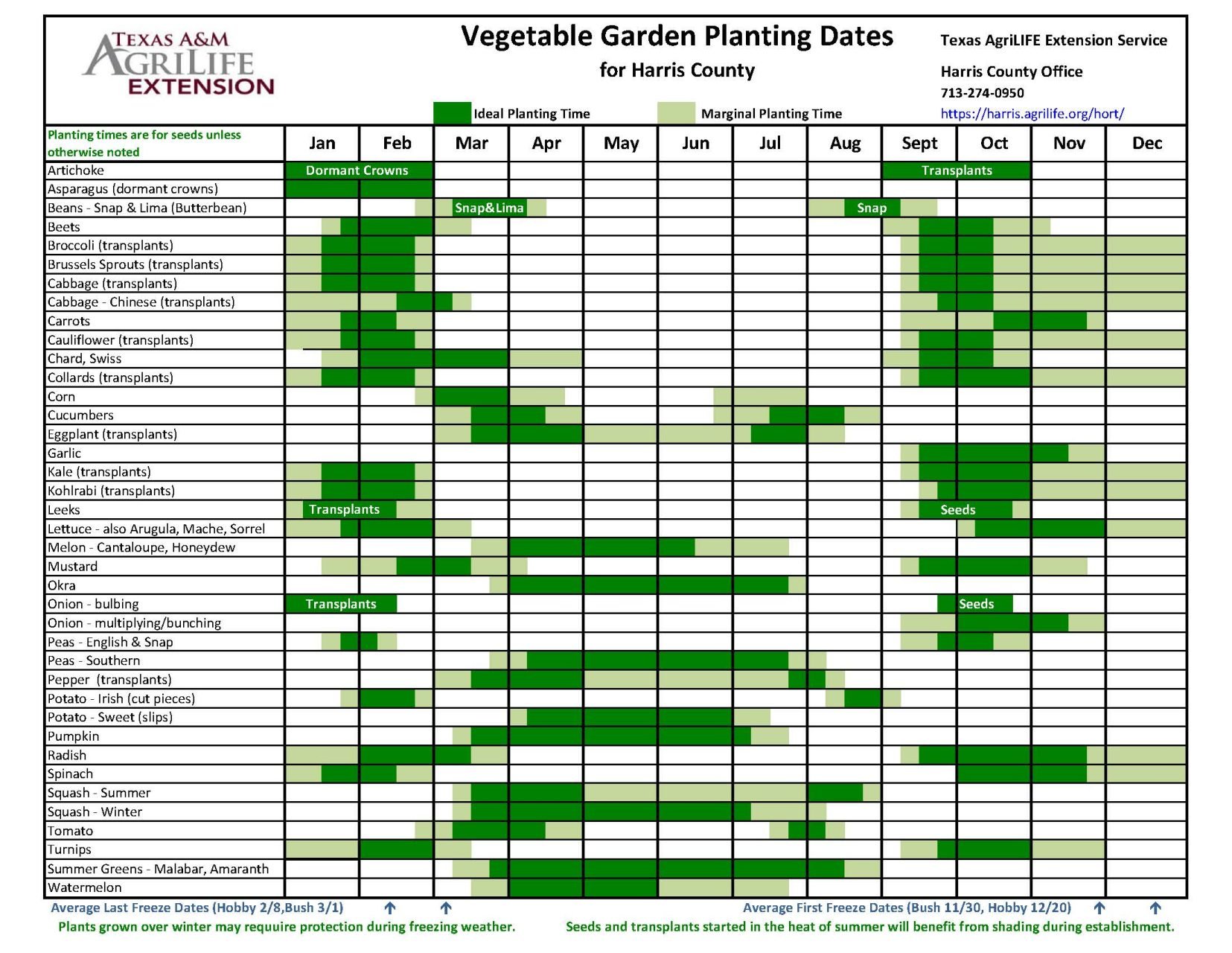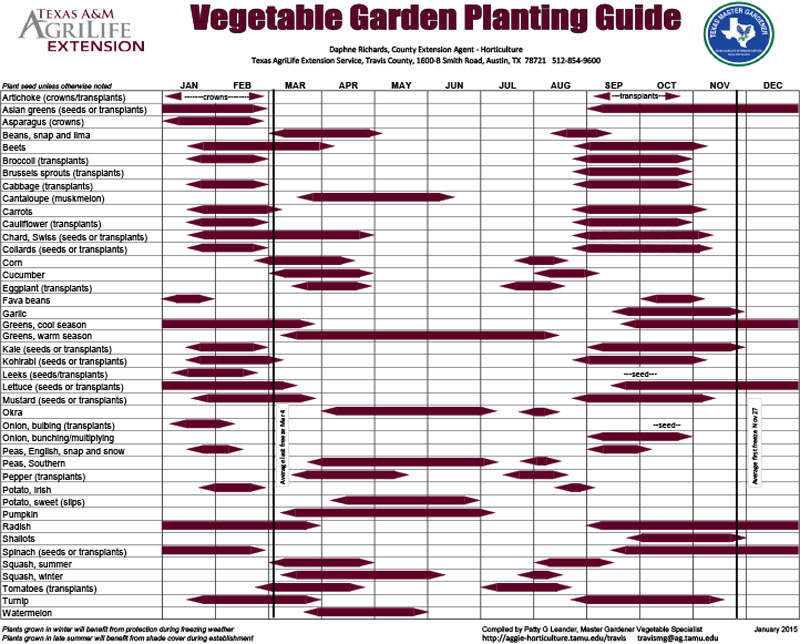Planting Your Central Texas Vegetable Backyard: A Complete Information
Associated Articles: Planting Your Central Texas Vegetable Backyard: A Complete Information
Introduction
With enthusiasm, let’s navigate via the intriguing matter associated to Planting Your Central Texas Vegetable Backyard: A Complete Information. Let’s weave attention-grabbing info and provide contemporary views to the readers.
Desk of Content material
Planting Your Central Texas Vegetable Backyard: A Complete Information

Central Texas boasts a singular local weather, characterised by scorching summers, gentle winters, and unpredictable spring and fall climate. This makes planning a profitable vegetable backyard a bit more difficult than in areas with extra constant seasons. Understanding the nuances of your native microclimate and utilizing a well-planned planting calendar is vital to a bountiful harvest. This information supplies a complete Central Texas vegetable planting calendar, together with suggestions for fulfillment on this particular area.
Understanding Central Texas’s Rising Seasons:
Central Texas usually experiences three distinct rising seasons:
- Spring (March-Might): This can be a prime planting time for cool-season crops. Temperatures are gentle, however can fluctuate wildly, so be ready for infrequent frosts or warmth snaps. Constant watering is essential, as rainfall might be unpredictable.
- Summer season (June-August): Summer season in Central Texas is scorching and dry. Warmth-tolerant crops thrive throughout this era, however correct watering and shade are important to forestall wilting and stress. Afternoon shade is especially useful.
- Fall (September-November): Fall provides a second probability for cool-season crops. Temperatures are usually gentle, with much less intense warmth than summer time. This season can present a second harvest for a lot of greens.
The Central Texas Vegetable Planting Calendar:
This calendar supplies a basic guideline. Your particular planting occasions could have to be adjusted based mostly in your location inside Central Texas (elevation, proximity to our bodies of water, and so on.) and the particular microclimate of your backyard. All the time test your native frost dates for essentially the most correct info. These dates can differ by a couple of weeks from 12 months to 12 months.
Cool-Season Crops (Finest planted in Spring and Fall):
| Vegetable | Spring Planting (Final Frost Date to Might) | Fall Planting (September to First Frost Date) | Notes |
|---|---|---|---|
| Lettuce | Early March – Might | Early September – November | Requires constant moisture; prefers partial shade in summer time warmth. |
| Spinach | Early March – Might | Early September – November | Much like lettuce by way of moisture and shade necessities. |
| Kale | Early March – Might | Early September – November | Tolerates cooler temperatures higher than different greens. |
| Broccoli | Early March – April | Early September – October | Wants constant watering and well-drained soil. |
| Cauliflower | Early March – April | Early September – October | Related necessities to broccoli. |
| Cabbage | Early March – April | Early September – October | Related necessities to broccoli and cauliflower. |
| Brussels Sprouts | Early March – April | Early September – October | Requires cooler temperatures for optimum progress. |
| Carrots | February – April | September – October | Wants unfastened, well-drained soil. |
| Radishes | February – Might | September – November | Quick-growing; might be planted a number of occasions all through the season. |
| Beets | February – April | September – October | Prefers unfastened, well-drained soil. |
| Peas | February – March | September – October | Wants cool temperatures; might be planted earlier in increased elevations. |
| Swiss Chard | March – Might | September – November | Tolerates warmth higher than different greens. |
| Garlic | Fall (October-November) | N/A | Plant cloves within the fall for a summer time harvest. |
| Onions (units) | Fall (October-November) or Spring (March) | N/A | Plant units in fall for a spring harvest or spring for a summer time harvest. |
Heat-Season Crops (Finest planted in Spring and Summer season):
| Vegetable | Spring Planting (After Final Frost) | Summer season Planting (June-August) | Notes |
|---|---|---|---|
| Tomatoes | April – Might | N/A | Wants full solar, well-drained soil, and constant watering. |
| Peppers | April – Might | N/A | Related necessities to tomatoes. |
| Eggplant | April – Might | N/A | Related necessities to tomatoes and peppers. |
| Squash (Summer season) | April – June | N/A | Wants well-drained soil and loads of solar. |
| Cucumbers | April – June | N/A | Wants well-drained soil and loads of solar; inclined to powdery mildew. |
| Zucchini | April – June | N/A | Related necessities to cucumbers. |
| Beans (Bush) | April – August | N/A | Comparatively straightforward to develop; wants well-drained soil and full solar. |
| Beans (Pole) | April – July | N/A | Wants assist construction to climb. |
| Corn | April – Might | N/A | Wants full solar and loads of water; take into account planting in blocks for pollination. |
| Okra | Might – June | N/A | Warmth-tolerant; wants full solar and well-drained soil. |
| Watermelon | Might – June | N/A | Wants loads of area; wants full solar and well-drained soil. |
| Cantaloupe | Might – June | N/A | Related necessities to watermelon. |
Succession Planting:
To maximise your harvest, follow succession planting. This entails planting a number of batches of the identical crop at totally different occasions all through the rising season. For instance, you may plant a batch of lettuce in March, one other in April, and a closing batch in September. This ensures a steady provide of contemporary produce.
Suggestions for Success in Central Texas:
- Soil Preparation: Central Texas soil might be difficult. Amend your soil with compost or different natural matter to enhance drainage and fertility.
- Watering: Constant watering is essential, particularly throughout the scorching summer time months. Use drip irrigation or soaker hoses to preserve water and keep away from wetting the foliage.
- Mulching: Apply a layer of mulch (similar to straw or shredded leaves) to retain moisture, suppress weeds, and regulate soil temperature.
- Pest and Illness Management: Monitor your crops commonly for pests and ailments. Use natural pest management strategies each time attainable.
- Daylight: Most greens want not less than 6-8 hours of daylight per day. Select a location in your backyard that receives ample daylight.
- Microclimate: Take note of your particular backyard’s microclimate. Areas with extra shade or higher drainage could require changes to the planting calendar.
- Hardiness Zones: Central Texas encompasses a number of hardiness zones. Understanding your particular zone (sometimes 7a, 7b, or 8a) will additional refine your planting decisions.
- Native Assets: Seek the advice of your native agricultural extension workplace or grasp gardeners for particular recommendation on rising greens in your space. They’ll present invaluable insights tailor-made to your native circumstances.
By rigorously planning your backyard and understanding the distinctive challenges and alternatives offered by the Central Texas local weather, you may take pleasure in a bountiful harvest of contemporary, homegrown greens all year long. Keep in mind to adapt this calendar to your particular location and expertise, and do not be afraid to experiment to seek out what works finest in your backyard. Completely happy gardening!








Closure
Thus, we hope this text has offered invaluable insights into Planting Your Central Texas Vegetable Backyard: A Complete Information. We hope you discover this text informative and useful. See you in our subsequent article!